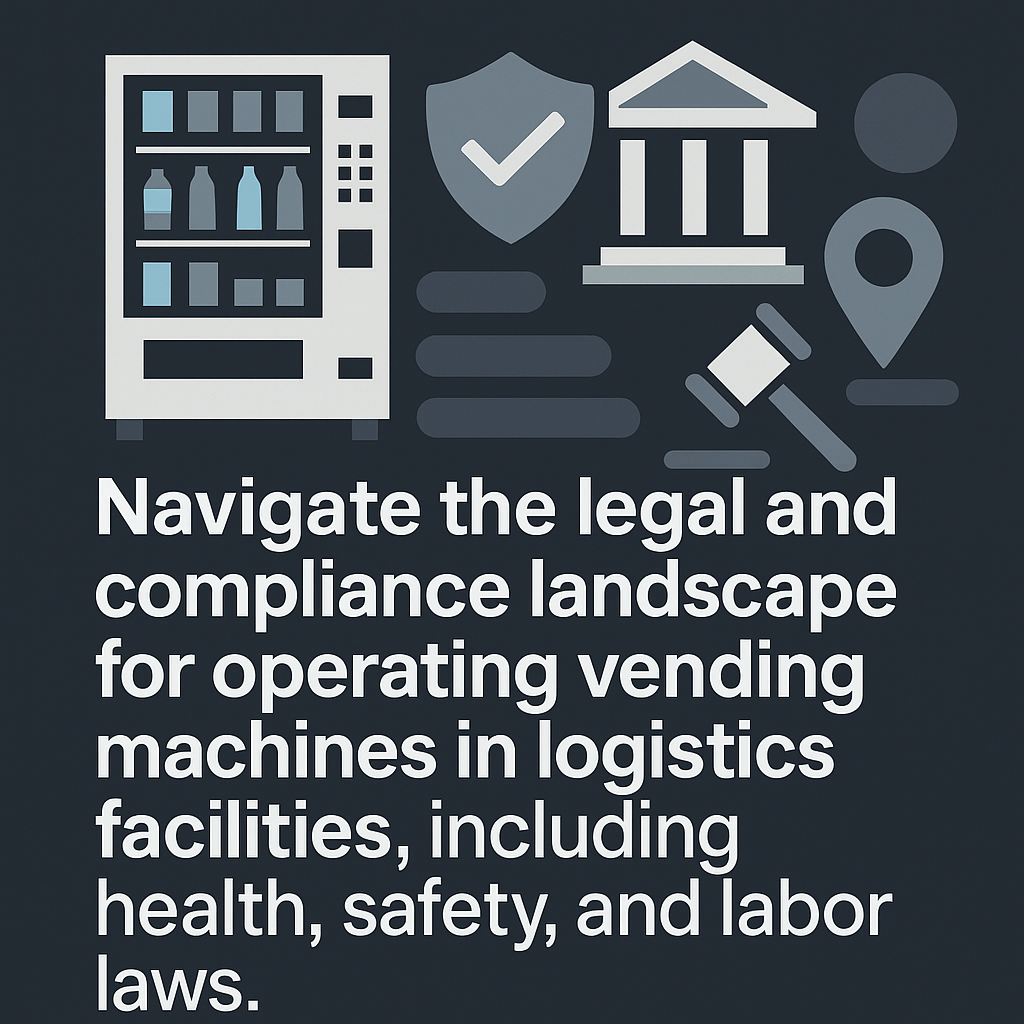Legal and Compliance Aspects of Vending in Logistics
Navigate the legal and compliance landscape for operating vending machines in logistics facilities, including health, safety, and labor laws.
Back to Vending For Logistics Hubs ResourcesNavigate the legal and compliance landscape for operating vending machines in logistics facilities, including health, safety, and labor laws.
Back to Vending For Logistics Hubs ResourcesOperating vending machines in logistics facilities demands careful attention to a range of legal and compliance standards. From health and safety to labor laws, understanding these requirements is critical for smooth operation and avoiding penalties.
![]() Maintain rigorous health and food safety standards for all products
Maintain rigorous health and food safety standards for all products
![]() Comply with labor laws regarding employee breaks and facility access
Comply with labor laws regarding employee breaks and facility access
![]() Adhere to strict facility security protocols and operational guidelines
Adhere to strict facility security protocols and operational guidelines

Logistics facilities, with their dynamic environments and critical operations, require a robust understanding of legal and compliance frameworks when integrating vending solutions. Ignoring these aspects can lead to significant fines, operational disruptions, and reputational damage. From ensuring hygienic food service to adhering to employee welfare standards, each element plays a vital role in seamless vending machine deployment.
Health and safety are paramount in any logistics hub. Vending machines, particularly those offering fresh food or beverages, must comply with strict food safety guidelines set by local, state, and federal agencies like the FDA. This includes proper temperature control, regular cleaning, and meticulous tracking of expiration dates. Furthermore, the physical placement of machines must not impede emergency exits or create trip hazards, aligning with OSHA standards for a safe working environment. Operators must also consider factors like equipment durability for industrial vending, ensuring machines can withstand the rigors of a warehouse setting without becoming a safety risk.
Providing vending machines as an employee amenity can boost morale and productivity, but it must be done within the bounds of labor laws. While vending offerings don't typically fall directly under mandatory break provisions, they should complement, not replace, designated meal and rest periods. For operations running 24/7, vending ensures that employees on all shifts have access to refreshments, supporting fair labor practices and employee well-being. Understanding 24/7 vending solutions for shift workers is therefore essential.
With the rise of cashless and smart vending machines, data privacy becomes a significant concern. Transactions involve sensitive financial data, necessitating compliance with payment card industry (PCI) standards and broader data protection regulations. Logistics companies, in collaboration with vending service providers, must ensure that all payment systems are secure, encrypted, and transparent regarding data collection and usage. For more on this, exploring topics such as connectivity requirements for vending machines can highlight potential compliance needs related to data transmission.
The operation of vending machines often requires specific business licenses and permits, which vary by location. It's crucial for both the logistics facility and the vending provider to understand and fulfill these requirements. Moreover, a comprehensive vending contract is essential. This document should clearly outline responsibilities for maintenance, restocking schedules, product liability, insurance coverage, and compliance with all facility-specific access and security protocols. Regular audits and reviews can help ensure ongoing adherence to these standards, protecting all parties involved.
Key concerns include health and safety regulations, labor laws, food safety standards, and compliance with facility-specific operational guidelines.
OSHA regulations might dictate placement to ensure clear pathways, prevent obstruction of emergency exits, and maintain electrical safety, especially in high-traffic or industrial areas.
Yes, food safety regulations (like HACCP principles for certain products) apply, requiring proper temperature control, product handling, and expiration date monitoring to prevent foodborne illnesses.
Data privacy laws (e.g., GDPR, CCPA) must be considered for cashless transactions, ensuring secure data handling, transparency about data collection, and employee consent where applicable.
Regulations vary by municipality and state. Businesses might need specific permits for food service, equipment operation, or even business licensing for the vending activity.
Vending machines should be accessible to individuals with disabilities, ensuring proper height for coin slots, keypads, and product retrieval, as well as clear floor space.
While generally beneficial, employers should be mindful of meal and rest break laws, ensuring vending options don't inadvertently create non-compliance or pressure employees to skip breaks.
Yes, liability insurance is crucial to cover potential incidents such as machine malfunctions, injury from falling machines, or food safety issues. The vending provider typically carries this.
Security protocols within logistics facilities often dictate where machines can be placed, access for servicing, and may require specific oversight to prevent theft or tampering.
Contracts should clearly outline responsibilities for maintenance, restocking, product liability, insurance, and compliance with all relevant laws and facility policies.